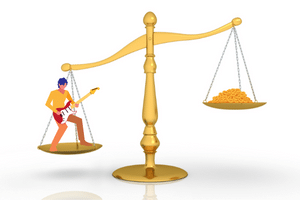So, you’ve been shredding your electric guitar in your bedroom, impressing your cat and maybe even your neighbors. But have you ever wondered what it would be like to take those skills to the next level? Well, my friend, it’s time to talk about the benefits of playing guitar in a band.
Trust me; it’s like going from playing air guitar to rocking a double-neck Gibson but in a good way!
You can use the table of contents below to take you to the area that interests you. Click on the little box to open it, and then click on the section of the article you want to read, or you can read from start to finish if you want the full guitar bane experience!
The Short Answer
The benefits of playing guitar in a band are multifaceted, ranging from technical skill development to social and emotional growth. The practical, real-world application of your guitar skills provides a unique platform for creative expression. However, navigating challenges like band dynamics and communication is essential. Overall, the experience can be incredibly rewarding and significantly enrich your musical journey.
Keep On Reading (Below) To Learn More
Why Consider Playing In A Band?

Before we dive into the nitty-gritty, let’s address the elephant in the room. Why should you even consider playing in a band?
Skill Enhancement
First off, playing in a band is like a fast-track ticket to Skillville. When you’re jamming with other musicians, you’re exposed to a variety of playing styles. This is a goldmine for learning new techniques and expanding your musical vocabulary.
Imagine trading solos with a saxophonist or locking into a groove with a killer drummer. These experiences can teach you things that hours of YouTube tutorials never could.
Networking Opportunities
Let’s not forget the networking aspect. Being in a band puts you in touch with like-minded musicians. You never know; today’s bandmate could be tomorrow’s collaborator on a hit song. Plus, you’ll meet other people in the industry, from sound engineers to gig organizers, expanding your professional circle.
Quick Comparison Of Solo Vs. Band Playing
This table sums it up nicely. When you play solo, you’re the captain of your ship, but the horizons are limited. In a band, you’re part of a crew sailing towards uncharted musical territories, offering a wealth of growth opportunities.
| Aspect | Playing Solo | Playing In A Band |
|---|---|---|
| Skill Development | Limited to self-learning & Lessons | Diverse skills from teammates |
| Social Interaction | Minimal | High |
| Exposure | Mostly online & from lessons | Live gigs, social media |
| Income Potential | Limited (giving lessons, etc.) | Higher (gigs, merchandise) |
| Time Commitment | Flexible | Scheduled practices |
| Genre Versatility | Up to you | Depends on band’s focus |
Musical Benefits Of Playing In A Band
Improved Timing
One of the first things you’ll notice when playing in a band is how crucial timing is. When you’re solo, a missed beat here or there might go unnoticed. But in a band, timing is everything. You’re part of a well-oiled machine, and every cog needs to turn in sync. This experience will sharpen your sense of timing like nothing else.
When I first started playing guitar, I focused more on speed than accuracy and precision. A metronome became my best friend after learning the hard way.
Using a metronome when practicing alone or even during band practice when trying to nail a difficult tune will fast-track your progress!
Expanded Repertoire
Another perk is the expansion of your musical repertoire. Maybe you’re a rock purist, but your drummer is into jazz, and your bassist loves funk. This melting pot of influences will introduce you to songs and genres you might never have explored otherwise. And let’s face it, versatility is a valuable trait for any musician.
Key Benefits And How To Maximize Them
This table gives you a quick rundown of the key benefits and how you can make the most of them. These tips will help you get the most out of your band experience, from regular practice sessions to learning new songs. Don’t forget to network as much as possible, which is a great way to get new gigs!
| Key Benefit Of Band Practice | How To Maximize It |
|---|---|
| Skill Enhancement | Regular practice sessions |
| Networking | Attend local music events |
| Improved Timing | Use metronomes during practice |
| Expanded Repertoire | Learn one new song per week |
The Social Benefits
Teamwork
When you’re part of a band, you quickly learn that it’s not just about you and your guitar. It’s about working together as a unit. Teamwork is the name of the game!
You’ll also learn to communicate musically, picking up on subtle cues like a nod from the drummer or a change in dynamics from the keyboardist. This kind of non-verbal communication is an art form in itself, one that can elevate a performance from good to unforgettable.
Boosted Confidence
Let’s talk about the “Big C,” Confidence! Playing solo can be rewarding, but there’s something electrifying about performing with a band.
Stage fright is a common hurdle for many musicians, but being in a band can be a game-changer. When you’re on stage with your bandmates, you’re not alone; you’re part of a team. This sense of unity can significantly reduce the pressure and anxiety associated with performing solo.
Plus, if you miss a note or two, chances are your bandmates will cover for you, turning potential mistakes into creative improvisations. The collective energy of a band can be incredibly empowering, helping you conquer stage fright and truly enjoy the thrill of live performance.
The shared energy and collective applause can do wonders for your self-esteem. And let’s be honest, nailing that solo during a live performance and getting a nod of approval from your bandmates? That’s a high that no energy drink can even come close to!
The Career Benefits
Exposure
Playing in a band can significantly boost your exposure. Whether it’s local gigs, social media posts, or even a YouTube channel, the collective reach of a band is often greater than that of an individual.
Each band member brings their own network, multiplying the number of people who get to hear your killer guitar licks!
Income Opportunities
Let’s not forget the financial aspect. While money shouldn’t be your only motivation, it’s a nice perk. Bands often have more opportunities for paid gigs compared to solo artists.
Plus, there’s the potential for merchandising. Ever thought of seeing your band’s logo on t-shirts or guitar picks? Well, that can be a revenue stream right there!
Tips For Maximizing Success
Choose The Right Band
Choosing the right band is like choosing the right guitar; it has to resonate with you. Look for a band whose musical and personal goals align with yours.
Are you in it for the love of music, or are you aiming for commercial success? You’re probably headed for greatness if the answer is both! Knowing what you and your potential bandmates want can save you a lot of headaches down the line.
Practice Regularly
Consistency is key when it comes to improving your skills and reaping the benefits of band life. Make sure to set a regular practice schedule and stick to it. This not only helps you improve but also fosters a sense of commitment within the band.
However, keep in mind that consistent practice ingrains habits, good or bad. So make sure you’re practicing the right things!
Common Challenges That Bands Face

Time Commitment
Being in a band isn’t just about the fun gigs and jam sessions; it’s also a commitment of your time. It’s essential to set a fixed schedule for practices and stick to it, ensuring that everyone in the band is on the same page.
Balancing band practice, gigs, and your personal life can sometimes feel like juggling flaming guitars. Lol
Creative Differences
Every band faces creative differences at some point, and it’s one of the most common reasons that bands break up! Maybe you’re into blues, but your drummer is pushing for more of a punk vibe.
How do you navigate these choppy waters? Open communication and a willingness to experiment can go a long way. Remember, the best bands often have a diverse sound born from the fusion of different influences!
Compromising With Other Band Members
In a band, you’re not just a musician; you’re also a diplomat of sorts. Compromise is often the glue that holds a band together.
Whether it’s deciding on a setlist, the direction of your music, or even the brand of beer for band practice, compromise is key. It’s about finding a middle ground where everyone’s voice is heard and respected.
This skill is not just valuable in a band setting but also for life in general. Learning to compromise enriches your social skills and helps maintain a harmonious environment, both on and off the stage.
Challenges And Solutions
This table provides a snapshot of the challenges you might face and offers practical solutions to overcome them.
| Challenge | Potential Solution |
|---|---|
| Time Commitment | Set a fixed schedule |
| Creative Differences | Establish a voting system |
| Financial Costs | Plan a budget for the band |
| Stage Fright | Start with small live sessions |
Why Bands Break Up And How To Prevent It

Ego Clashes
One of the most common reasons bands disband is due to ego clashes. When individual egos overshadow the collective goal of the band, it’s a recipe for disaster.
The key to preventing this is to remember why you formed the band in the first place: for the love of music. Keep egos in check and focus on what’s best for the band as a whole.
Creative Differences
As mentioned earlier, creative differences can be a double-edged sword. While they can lead to a unique sound, they can also be a point of contention. The key is to find a balance and be willing to compromise. Regular band meetings to discuss the musical direction can help keep everyone on the same page.
Lack of Commitment
A band is like a relationship; it requires commitment from all parties. When one or more members aren’t fully committed, it can lead to the band’s demise. To prevent this, make sure everyone is clear about their roles and responsibilities, and hold regular meetings to check in on each other’s commitment levels.
Financial Disagreements
Money matters can quickly turn bandmates into adversaries. Whether it’s about how to split gig earnings or invest in new equipment, financial disagreements can be corrosive.
The solution? Be transparent about finances from the get-go and consider drafting a band agreement that outlines how money will be handled.
Expert Opinions On Playing Guitar In A Band

Music Educators
Music educators often emphasize the educational benefits of playing in a band. According to them, a band setting provides a real-world application of music theory and technique.
It’s one thing to learn scales and chords in isolation, but applying them in a band context offers invaluable experience. Educators also point out that playing in a band can improve your ability to listen and adapt, skills that are crucial for any musician.
Professional Guitarists
Ask any pro guitarist, and they’ll likely tell you that some of their most significant growth came from playing in a band. The shared experience of making music with others can be both humbling and enlightening.
In addition, many professional guitarists credit their band experiences for teaching them stage presence, improvisation skills, and the importance of teamwork. In essence, a band can serve as a training ground for aspiring professional musicians.
Guitar Technicians
Even guitar techs have something to say about the benefits of playing in a band. From their perspective, a band setting can teach you essential maintenance skills.
When you’re part of a band, you’re more likely to encounter various technical issues, from string breaks to amp malfunctions. It’s Murphy’s Law, right?
Learning to handle these issues efficiently and effectively is a skill that every guitarist should have, and there’s no better teacher than experience.
My Personal Experience With Playing In Bands

I remember the early, sweet, sweet sound of band life like it was yesterday! I’d been strumming and drumming in bands since my awkward middle school days.
Picture this: my neighbor’s buddy, a Rhythm And Blues aficionado in his mid-20s, became my unwitting guitar guru. I pestered him to teach me licks and riffs until he finally caved, probably just to get me off his back!
Zoom ahead six months, and there I was, the young gun playing rhythm guitar in his band. Age difference? Pfft, what’s that? Sometimes, being a relentless little bugger pays off! Those two years laid down the bedrock for my entire musical journey.
A Little Experience Changes Everything
High school rolled around, and I was ready to rock, literally! Armed with my newfound skills and a dash of managerial flair, I launched my Rock and Metal band from hell! Lol
I had dreams of a wall of Marshall amps that went up to 11 because, let’s face it, 10 just isn’t loud enough. Our goal was to play so loud that even the folks in the next county would know when our band was practicing!
Sure, we had our share of creative clashes and a revolving door of band members, but man, did we own the stage! From winning the battle of the bands to rocking high school dances, those were the days!
As I ventured into the realms of higher education, my guitar was my trusty sidekick. College and grad school saw me jamming in an eclectic mix of bands and even moonlighting as a guitar teacher to cover some of those pesky fees for books and tuition.
The cherry on top? I scored an apprenticeship in guitar building and repair, thanks to the skills I’d honed over the years.
Fast forward to today, and I’m still shredding, still loving the band life, and still grateful for every chord, gig, and bandmate that’s come my way!
Don’t Let “Band Drama” Kill Your Epic Gigs!

The band life can be like a rollercoaster of epic gigs, killer solos, and… drama? Yep, you heard me right. The single most important thing to beware of when playing in bands is the dreaded “Band Drama.” I’m talking creative clashes, ego trips, and the infamous “Who drank my last beer?” debates.
Band drama often starts with poor communication. You see, when you’re jamming at 120 decibels, it’s easy to forget that talking at a normal volume is crucial. So, think about investing in a good ol’ whiteboard or using a shared Google Doc where everyone can jot down their ideas, preferences, and grievances.
Another hot tip? A band agreement! It may sound formal for a bunch of pals jamming out, but a band agreement can be a lifesaver. Outline who’s responsible for what, from gear maintenance to social media updates. Trust me, nothing says “success” like clearly defined roles and responsibilities.
So, keep the lines of communication open, and you’ll be rocking out drama-free. Well, mostly. Lol
Key Takeaways And Final Verdict

Here are the five essential points to remember about playing in a band.
- Band Chemistry Matters: The vibe between band members can make or break your experience. It’s best to prioritize chemistry over skill level when forming or joining a band.
- Set Boundaries Early: Whether it’s about personal space or musical direction, setting boundaries early on can prevent misunderstandings and conflicts.
- Social Media Savvy: In today’s digital age, having a strong online presence can significantly boost your band’s reach. Don’t underestimate the power of a well-curated Instagram or YouTube channel.
- Audience Engagement: Learning how to interact with the audience can elevate your live performances. Simple things like eye contact and crowd participation can go a long way.
- Celebrate Small Wins: Every gig you land, every song you nail, and even the small improvements you notice are all wins. Celebrate them to keep the morale high.
Frequently Asked Questions

Here are some of the questions I get asked about playing guitar in a band.
If your question does not appear here, please put it in the comments, and I will get right back to you with an answer.
Why Does A Band Need Two Guitars?
Having two guitars in a band allows for a richer and more layered sound. One guitarist typically handles the rhythm parts, providing the chordal foundation, while the other focuses on lead parts, solos, and embellishments. This dual-guitar setup can add depth and complexity to the band’s overall sound.
How Many Songs Should A Guitarist Know?
The number of songs a guitarist should know can vary based on goals and the type of gigs they’re playing. Knowing a couple dozen songs will usually suffice for a casual player. However, for a professional musician or someone in a cover band, a repertoire of about 50 songs would offer greater flexibility and preparedness for various gigs.
How Long Does It Take To Sound Good On Guitar?
The time it takes to sound “good” on the guitar varies from person to person and depends on the amount of dedicated practice. Generally, with consistent practice of at least 30 minutes to an hour a day, most beginners can expect to play simple songs and chords decently within a few months. However, mastering the instrument is a lifelong journey.
Why Do Bands Use Different Guitars?
Bands use different guitars to achieve a variety of tones and textures in their music. Different types of guitars, such as acoustic, electric, and bass, offer distinct sounds that can suit different songs or parts of songs. Additionally, even within the same category, different brands and models can produce unique tonal qualities that contribute to the band’s overall sound.
What Guitar Do Most Bands Use?
There’s no one-size-fits-all answer, but some of the most commonly used guitars in bands are models from Fender, Gibson, and Ibanez. The Fender Stratocaster and Gibson Les Paul, for example, are iconic and versatile guitars that have been used across various genres. The choice often depends on the specific sound and style the band is aiming for.
How Do I Find Band Members?
You can use social media, local music forums, community boards, and local music stores to connect with like-minded musicians. Perhaps you know a musician who is interested in joining a band or can recommend other musicians to reach out to.
What’s The Ideal Band Size?
There’s no one-size-fits-all answer. It depends on your genre and the sound you’re aiming for.
Should We Have A Band Manager?
If you’re just starting, probably not. As you grow, a manager can help with logistics and bookings.
How Often Should We Practice?
Aim for at least once a week, but the more, the better—especially before gigs.
Is It Necessary To Record A Demo?
No, but it’s a great idea! A demo helps you get gigs and gives people a taste of your music.
What’s A Rider?
It’s a set of requests or needs that a band requires for a performance, often provided by the venue.
How Do We Get Paid For Gigs?
Payment terms should be discussed and agreed upon in advance. Having a written contract is a good idea.
Should We Play Covers Or Originals?
A mix of both is usually a good idea, especially when you’re starting out.
How To Handle Negative Feedback?
Take it constructively. Use it as an opportunity to improve the sound of the band and the material you play.
Do We Need A Sound Engineer?
A sound engineer can significantly improve your sound quality for bigger gigs and recordings.
What Is Backline Equipment?
It’s the amplifiers and other gear provided by the venue for a gig.
How To Promote Our Band?
Utilize social media, word of mouth, and local press. Consider hiring a PR agent as you grow.
What Is A Setlist?
It’s the list of songs you plan to perform at a gig.
How Long Should Our Set Be?
For most gigs, aim for a 45-minute to 1-hour set. For a warm-up band, a 20 to 30-minute setlist should be adequate. Headlining at larger venues or increased band popularity may require longer set lists of 1 ½ to 2 hours.
Should We Sell Merchandise?
Yes, it can be a good idea if you have a following. Merchandise like t-shirts and CDs can be an additional revenue stream.
How To Choose A Band Name?
Make it memorable, easy to spell, and reflective of your music style.
What Are Royalties?
They are payments made to songwriters for the use of their music.
How To Protect Our Music?
Copyright your original songs to protect them legally.
What Is A Gig Swap?
It’s when two bands agree to open for each other at their respective local venues.
Should We Use In-Ear Monitors?
For larger venues and more complex arrangements, in-ear monitors can help with sound clarity.
How Many Guitars Is Too Many In A Band?
The number of guitars that might be considered “too many” really depends on the genre and the sound the band is aiming for. However, having more than two or three guitars could potentially clutter the sound and make it difficult to distinguish individual parts. Balance and arrangement are key.
Final Thoughts

In the electrifying world of music, the benefits of playing guitar in a band are numerous and impactful. From honing your technical skills to building lifelong friendships, being part of a band is an experience like no other. But remember, it’s not all roses and power chords; there are challenges to navigate, like the ever-dreaded “Band Drama.”
Expert opinions from music educators, professional guitarists, and even guitar techs all point to the invaluable lessons you gain from jamming with others. Whether you’re a newbie or a seasoned player, the band setting offers a unique platform for growth and creativity. And let’s not forget the importance of communication and setting boundaries—skills that are as crucial offstage as they are on.
The FAQ section tackled some burning questions, from the ideal number of guitars in a band to the intricacies of gig payments. These are the nitty-gritty details that can make or break your band experience.
So, whether you’re dreaming of fame, fortune, and playing through a wall of Marshall amps or just looking to jam with friends, remember that the journey is as important as the destination. Keep rocking, and may your band life be glorious!

Here’s a video from Blues Guitar Institute that demonstrates how to be more creative when playing along with another guitar player in the band. Check it out!
What To Read Next ➡ Why Do Bands Have 2 Guitarists? – Is More Better?
Tell Me What You Think

Please leave a comment below if you enjoyed this article, have any questions about playing guitar in a band, or want to give your point of view. I will be happy to help you.
- What was your biggest advantage of playing guitar in a band?
- How many guitar players do you have in your band, and Why?
- Has this article convinced you to join or form a band?
- What else is on your mind?



Great article. It was interesting to read such a deep dive into the benefits of joining a band. It is also timely for me. After 10+ of not playing I am thinking of picking up acoustic guitar again with a view potentially of joining our music team at church. I actually signed up for your free book as I’m hoping it’ll help me get back into playing again. I’m a little ‘older’ so a bit concerned about aging joints, not being able to stretch like they did. I appreciated your tip about using a metronome as I know the teams play with click tracks to stay on time, and I have never done that so the metronome will be useful. I’m assuming ‘there’s an app for that.’
Hi Debbie
I appreciate your comments!
I think it’s great that you’re considering picking up the guitar again! I wouldn’t worry too much about your age. You can always put a lighter gauge string set on your guitar.
I also have an article on my site about playing guitar with arthritis that may interest you; just look for it in the search bar.
Practicing with a metronome is always a great idea! You can buy a digital one or use one for free online. The digital ones typically have more adjustment options, but the free ones are fine for most players.
I hope you’re finding my book useful!
Best,
Frank
Hey Frank,
I like that you have touched on choosing the right band. Far too often, person who wield a talent like musicians and artists get excited to be part of the bigger picture but do not check to see if it the right fit. This can then end negatively or, worse, discourage one from the craft.
Dee J.
Hi Dee
Thank you for your comment!
I agree that band member selection is essential since success requires a long-term commitment to work together and achieve the best possible result.
Rotock On
Frank